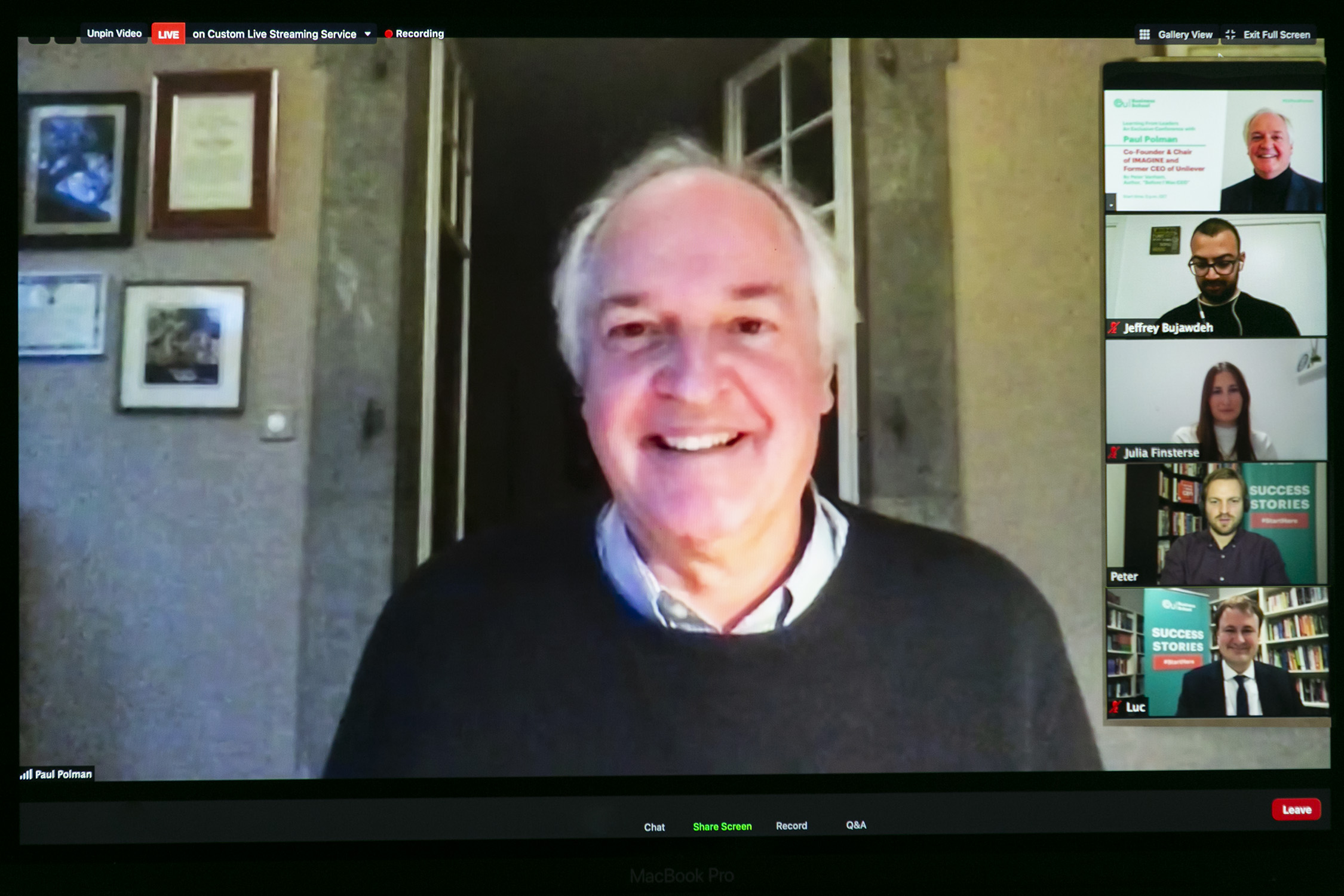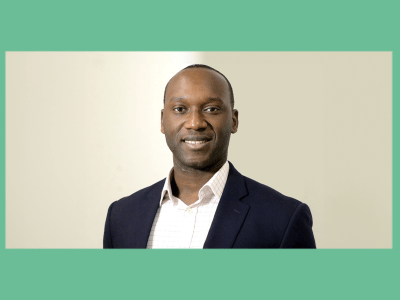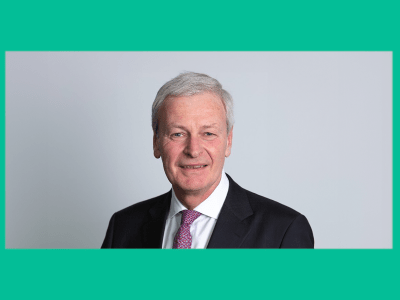“The crisis we have is a crisis of moral leadership” – Paul Polman, Co-Founder & Chair at IMAGINE
Visionary business leader Paul Polman joined us for a rousing Learning From Leaders’ conference in January 2021. Former CEO of Unilever, Paul is co-founder and Chair of IMAGINE whose mission is to support business leaders to build a sustainable future. In a fascinating interview with Peter Vanham, author of “Before I Was CEO”, Paul discussed his business philosophy and shared advice for budding business leaders. He urged everyone to work for future generations by adopting sustainable practices and by taking on board the United Nation’s 17 Sustainable Development Goals (SDGs), which offer plentiful business opportunities.
Here we’ve distilled some of Paul’s most pertinent insights, shared with the EU Business School community at this prestigious virtual event.
Taking the Time to Reflect
An unshakable optimist, Paul acknowledged the challenges of 2020 but also described the benefits of having had the past year to reflect: “When you push the pause button on a computer everything stops, but when you push the pause button on a human being, I think everything begins”, he said. 2020 provided humanity with a lot of time to reflect. Paul commented: “As a race, we are not really on the ball. We were not making the changes fast enough; we were debating, discussing, but we lacked the individual and collective courage to really do what was right – to attack the burning issues of climate change and inequality.” He continued: “I think 2020 has been a good year because it made a lot of people realize the inter-relationships between biodiversity, human health and climate.”
Although the pandemic has caused considerable suffering, there are some positive effects as well: “2020 has given us a good opportunity to increase the collective and individual level of consciousness and also to start thinking differently about how we should be moving forward”, Paul noted.
The Need for a Marshall Plan for the Planet
As 2021 begins without the reset for which we all longed, it’s clear that we must learn to live with coronavirus. What’s more, despite the $15 trillion spent on stabilizing the economies of developed countries around the world, 20-30% of SMEs are still at risk of going out of business. The pandemic caused 86 million people to fall back into poverty, and the World Food Program has calculated that 265 million people now face acute food security issues. 500 million jobs have been lost around the world according to the International Labor Organization. Rising unemployment has further exacerbated inequality and disproportionately affected women and young people. These challenges seem unsurmountable.
However, Mr. Polman remained optimistic and offered a constructive approach to building a better future: “A lot of things are broken that we cannot solve by trying to change it within the current system, and sometimes you need to break more things to rebuild it back better.” And, he pointed out, “The cost of inaction is going to be higher than the cost of action.” After WWII, the U.S.A. developed the Marshall Plan to foster growth and job creation in war-ravaged countries around the globe. Now, Paul argues, “We need to have a ‘Marshall Plan’ to redesign our economic system. We need to do this collectively at a global level – we cannot solve these issues at a local or individual level. And that means we need to attack without hesitation the transition to a greener economy; we need to start investing in protecting our biodiversity; we need to take care of our emerging markets and have financial markets become again servants to the real economy, instead of, as many people would argue, the real economy being subservient to the financial markets.” According to Paul, “With a relatively modest investment of just 1-2% GDP we can decarbonize our global economies,” a humble sum when compared to the cost of tackling disasters caused by climate change. As Vice Chair of the U.N. Global Compact, it goes without saying that he knows what he is talking about.
Actions Being Taken to Address Climate Change
Thankfully, momentum is building in the global fight against climate change. China has committed to net zero carbon emissions by 2060, a major milestone for one of the world’s most polluting countries. The European Green Deal has committed the EU to net zero emissions of greenhouse gases by 2050; Japan and Korea have followed suit; and 70% of the G7 have also made net zero commitments, most of which are for 2050. Finally, at the time of the conference, President-elect Joe Biden had just promised to rejoin the Paris Agreement. Moving forward, he said, the U.S.A. will play a more leading role in combating climate change.
2021, Mr. Polman said, will be a year of action. The U.N. Biodiversity Conference takes place in Kunming, China; the U.N. Climate Change Conference, known as COP26, is being held in Glasgow, Scotland; and the U.N. Food Systems Summit and Tokyo Nutrition for Growth Summit will also take place this year. It is not too late to make change, as long as we act with speed.
The Role of Business in Building a Sustainable Future
Paul Polman believes that businesses must play an essential part in creating a better, more sustainable and equal world for us all to inhabit: “Businesses have a key role to play because they are the first ones who will suffer the effects of societies not functioning. Business cannot succeed in societies that fail.”
According to Paul, “Every business needs first and foremost to realize why they are here – that they are here to solve problems in society […] If a business cannot say what they do positively to make this a better world, why would we keep these businesses around?” He described the necessary transition from CSR or corporate social responsibility, which is essentially “being less bad”, to RSC – responsible social corporations. He also pointed out that consumers, especially the young generation, expect responsible sustainable practices from business and that greenwashing is no longer an option.

What’s more, 90% of the U.N.’s Sustainable Development Goals require businesses to act in order to succeed. “Businesses that understand that will do very well,” Paul explained; the Business & Sustainable Development Commission has calculated that the SDGs offer $12 trillion worth of opportunities and have the potential to create 380 million jobs. “It’s probably the best business plan we have at a time when everyone is looking for opportunities and growth.”
Arguments For a Circular Economy
A circular economy offers a responsible and sustainable way to create growth. Given that last year Earth Overshoot Day was August 22, and, in Paul’s words, “after that date every day we are stealing from future generations,” it is essential to reform our systems to sustain healthy people and a healthy planet. Currently, only 9% of what we produce is reused, which means an astonishing 91% is discarded. It’s a completely unsustainable system. Instead, Paul advised, “we need to think regeneratively.”
As an example of how a regenerative circular system can be implemented, Paul explained some of the work IMAGINE is doing to transform food production systems in collaboration with the top 28 food companies globally. Food production currently causes deforestation, tremendous waste, uses chemical pesticides and, ultimately, causes about 20% of global warming. But our food systems should be part of the solution, not the cause, Paul believes. Which is why they are supporting these top companies to transition, collectively, to regenerative agriculture. The first step is to create a pre-competitive space where they can come together to talk about their contribution to securing the future of humanity. The issue is too big for any one company to make meaningful change alone. Secondly, it’s important to agree definitions and put together measures that lay out exactly what they need to achieve. With regenerative agriculture, key performance indicators could include soil health, carbon capture, the restoration of nature and the wellbeing of farmers. This creates a framework for the companies involved to start taking action and to hold themselves – and each other – accountable. And, Paul believes, working in this way is good business sense as well. With regenerative agriculture, for example, carbon is sequestered from the atmosphere, which helps to solve the problem of climate change. But at the same time, this makes the soil healthier, increases yield, enables farmers to sell carbon credits which can in turn solve smallholder farmer’s livelihood issues – it is a win-win solution with wellbeing, planetary and economic benefits.
As Paul summarized: “Companies that have decarbonized already, that have disclosed their risks, that have plans in line with the Paris Agreement that are science-based they tend to be more profitable. They have taken risks out of the system, they have identified opportunities, and all of this then starts to make business sense.”
A Visionary Business Leader
Paul Polman has been described by the Financial Times as “a standout CEO of the past decade”, and by himself and others as an “activist CEO”. There is no question that his belief in business as inseparable from the moral responsibility we have towards each other and towards the planet is visionary.
Paul commented: “I have always believed that any system where too many people feel they are not participating or are being left behind will ultimately rebel against itself; you cannot make a world function if you don’t live in harmony with fellow human beings and in harmony with human nature.” “I feel that my task is to fight for the underrepresented, the people who can’t be at the table. There are still too many of them and I’ve always believed that.”
As a CEO, he feels it is his obligation to take actions in the service of others. Which is one reason for being against the Milton Friedman business philosophy of shareholder primacy which has, he commented, “proven over and over again not to be a good strategy.” Business decisions should not be based solely on profit but guided by the company’s values and purpose.
However, Paul recognizes that his approach is still fairly unique. He said, “the crisis that we have is not really a crisis of climate change or inequality, it’s a crisis of moral leadership where people have increasingly put the interests of themselves ahead of the common good.” Coronavirus was not a surprise, he remarked: “we have destroyed nature too much for too long”, and zoonotic diseases are an inevitable consequence of that. But, he said, “the real black swan was our lack of ability to collectively rise to the challenge.”
Paul continued: “We live in a world where adults behave like children and the children behave like adults”. As 50% of the world population is below the age of 35, “I would argue it is time we give them the table”, rather than just a seat at it. “The main challenge is we need a different kind of leader”, Paul reflected. At the moment, CEO turnover is going up – 40% of companies have had three or more CEOs in the last 10 years and over 50% have had to appoint an emergency CEO. Not only this, but only 7% of boards are climate competent and only 1% include minority candidates, with women also underrepresented. “We have to invest in the right leaders. We have to reinvent the way we teach people what leadership is.”
Advice for a Prosperous and Fulfilling Career
To become a brilliant leader, it is necessary to build a fulfilling career. Paul offered his advice for how to get there:
- Find out what you are passionate about.
- Discover what you are good at.
- Understand what the world needs.
- Look at that intersection to see what opportunities are available.
- Decide if you want to do something yourself or work with others already focused on that intersection.
- If you choose to collaborate with other people or businesses, make sure your values are aligned.
By following these steps, you will be able to unlock a tremendous amount of energy, Paul assured the audience, and that will lead to success.
He also warned attendees at the conference that, “many people define themselves by their net worth or their titles or the power they have, but this is not a world anymore of formal authority, it is a world of moral authority.” Above all, instead of seeking to be above others and to criticize difference – whether that’s cultural, age, rank, gender and so on – “we should try to understand and seek common ground.”
Only 5% of the world’s population have access to such luxuries as soap, an inside bathroom, sufficient food and free education, luxuries that give them the attendant opportunities of health and prosperity – the choice of where and how to live and work. So, Paul said, “if you win the lottery ticket of life it is your obligation to put yourself in the service of others”. But this is not an entirely selfless act, because “the more you are able to give, the more you will receive, the better you will feel and the better you will do.”
Paul’s closing statement was an inspiring call to action for professionals and future leaders, like EU’s students and alumni, to rise to the challenge of making a better world for us all to inhabit: “It needs all of us to rise to the true level of leadership, putting yourself in the service of others, feeling uncomfortable, operating with a high level of humility and humanity where words like empathy and compassion are going to rule […] Living your purpose is the most important thing. Do that with passion and along the way maintain a positive attitude. […] It is always better to be an optimist because at least you will have a nicer life!”
Learn To Lead From The Best
At EU Business School, our pragmatic approach prioritizes opportunities for students to interact with and learn from leaders and experts at the cutting edge, preparing them with the tools and mindset they need to thrive in an ever-changing business landscape.










